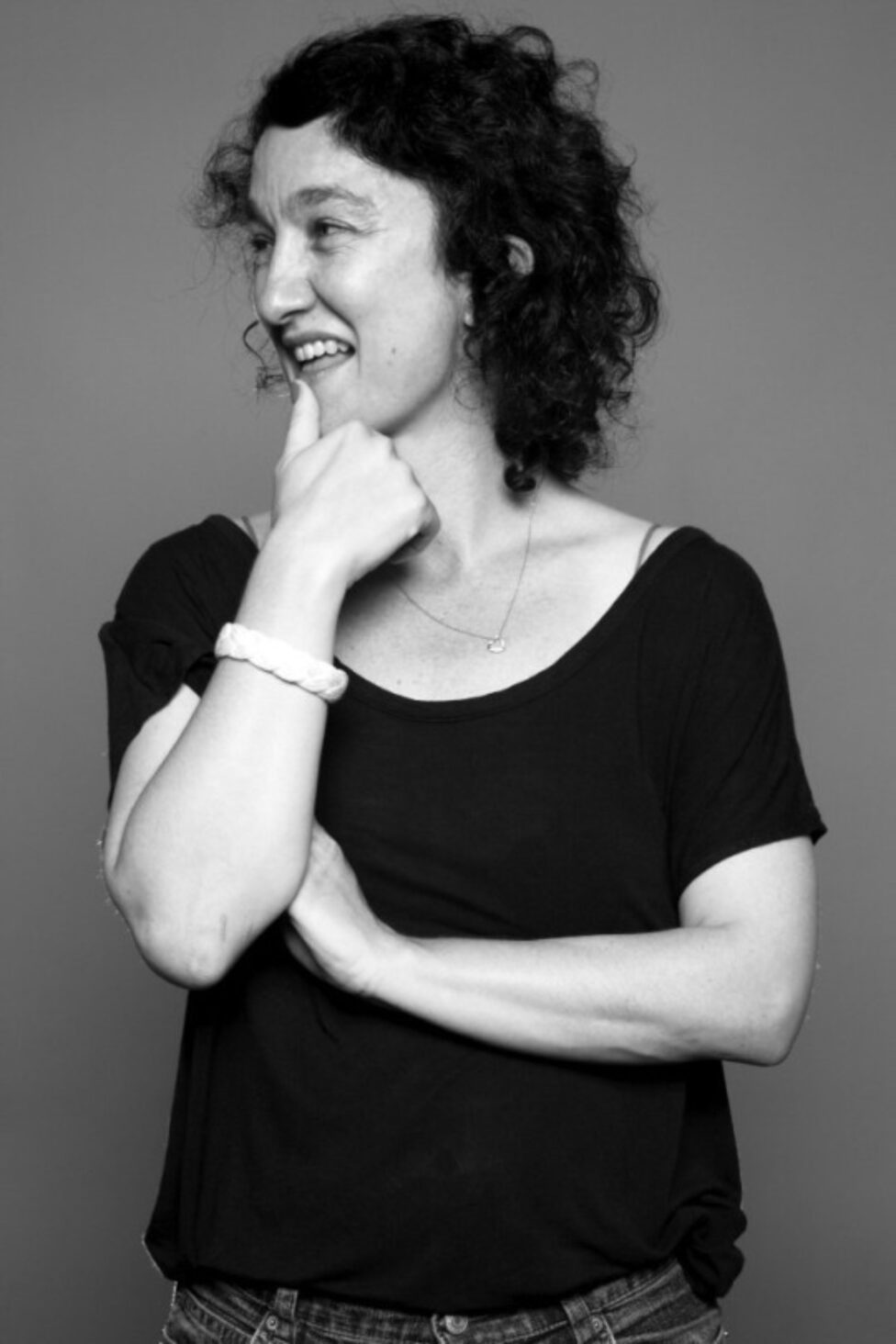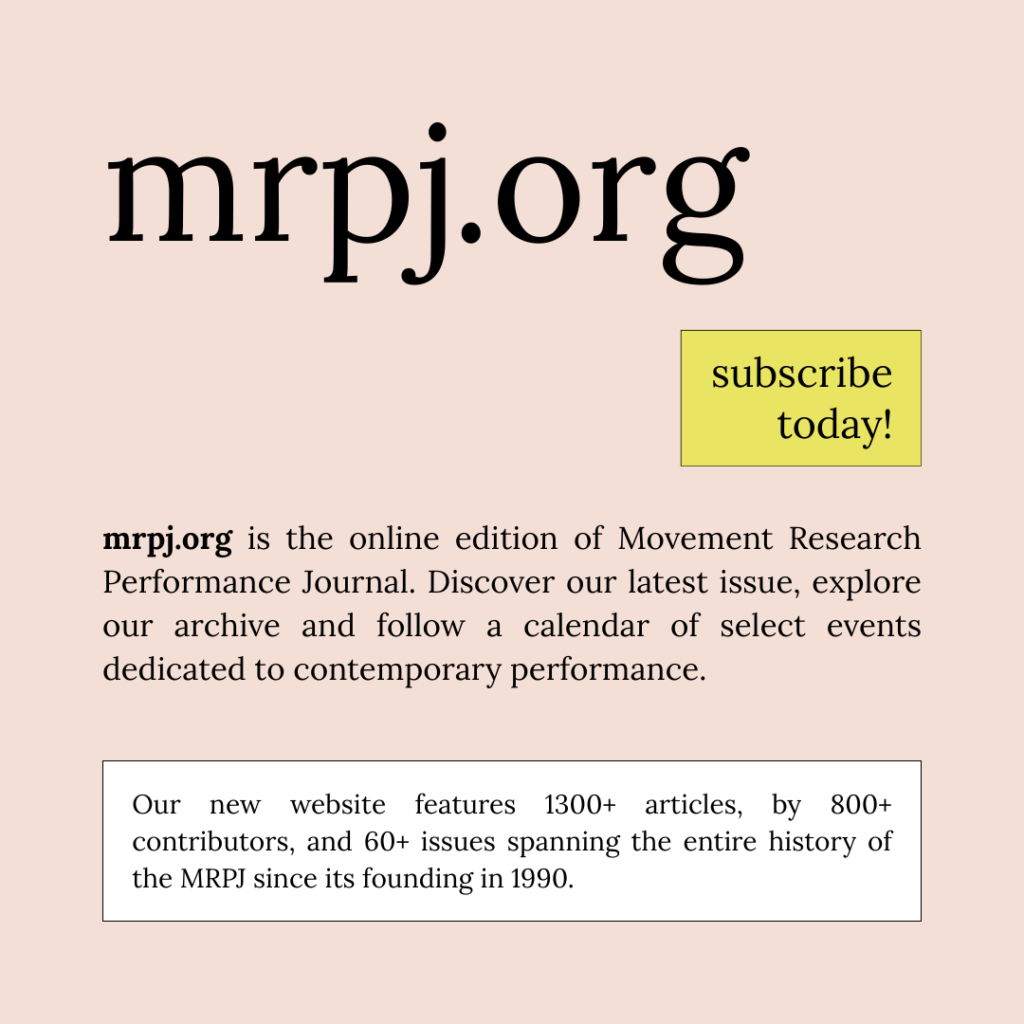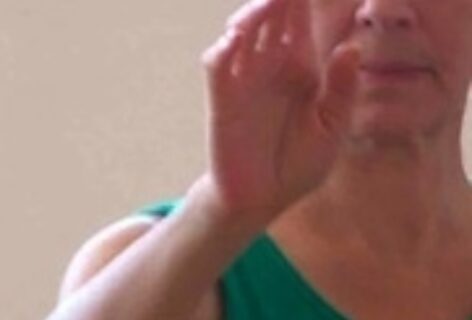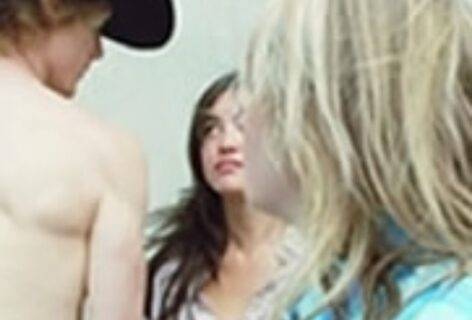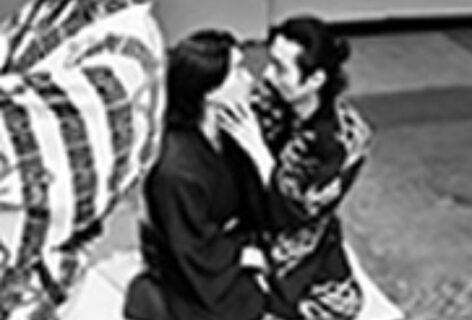The conversation between Lightsey Darst and Jeanine Durning took place over email during several months in 2013.
Lightsey Darst: I saw inging here in Minneapolis in December. Somewhere in the verbal storm of it, I had the whimsical thought that you became a choreographer because your last name is a gerund, and you were trying to figure out what it might mean to durn.
Jeanine Durning: When I first read this, it took me many moments to stop laughing. I got a real kick out of it. For several reasons. One is that the name Durning, or rather Dhurnin in Irish, means FIST. Apparently, I come from a clan of fisters, which would mean according to inging that I am trying to figure out how to fist, or that I am fisting. And I guess the idea of that makes me laugh. The other reason it gave me a kick, and probably more accurate to the task and condition of inging, is that I landed on something through this practice of non-stop speaking that is, for me, about my whole being, unfiltered, and doesn’t so much concern itself with formalism, design, dramaturgical arcs, the compositional mind (although it’s quite compositional), beautiful moves or or or. . . whether or not this or that transition works.
LD: Can you say a little more about the “condition of inging,” as you call it?
Video still from inging, by Jeanine Durning
JD: Something that always comes up in almost every iteration of inging I do is that moment when people who have come to check it out all of a sudden realize that the words that I’m speaking don’t, and will not, add up to a consequent narrative or overall informational experience. I call it a “dropping into the mind of the room.” Some people accept this and go, and some people don’t, and that creates a necessary performative tension. It’s tricky because it also takes time for me to “warm-up” to this “dropping in.” At the beginning, I am calibrated—following the velocity of my thinking, taking in the temperament of the room, seeing that person, anticipating that expectation, aware of the orbiting of all of these thoughts and awarenesses and how they synaptically function, how they affect my relationship to language, my relationship to sound, my relationship to information sitting side by side. My brain, at the beginning, is still working on a frontal lobe capacity—making rational associations, linkages, correspondences—but after a while, after that aspect of my brain gets tired, there is some other organizing principle taking effect. The body becomes more active, by necessity. The body starts to inform the language and the action of my body starts to affect the relationship of thought. More memories, more paradoxical, non-rational relationships, visceral, emotional, parataxical. And or but (not sure what the correct conjunction is there) because I have committed myself to this task of non-stop and continuous speaking, number one, and that it is unscripted, number two, the longer it goes, the more ratcheted the stakes become because I am aware that I am no longer on the map of language, yet still using language. This is where, for me, performance is. The presence of someone in a committed state, in an effort to share something, in spite of not knowing what the outcome might be. (I always say in my classes that technique is a constant negotiation—being able to adapt to contingencies and what you don’t know about any given circumstance.) It is exposing and terrifying to a degree because I have given myself the task to accept what comes up—to not cleverly use it compositionally, to not prioritize this or that material—but to allow it to become a void, if necessary. And in my experience, this is always necessary.
Jeanine Durning in inging at American Realness Festival, NYC, 2013 (credit: Ian Douglas)
So that’s the closest answer that I can come to. I’m better at saying what the work isn’t—than what it is.
LD: What are your favorite words?
JD: This makes me think of James Lipton’s interviews for The Actor’s Studio. He always asks his guests at the end of the interview what their favorite words are, and then what words they don’t like. The best thing about the responses is not so much the word itself, but being able to hear the actor say the word, because the saying of it gives more of an indication of their particular relationship to that word, and its particular connotation.
Anyway, I think I like certain words for their connotation and other words for their rhythm and then other words for their sound. I also like neologisms if they’re not those made up words that neo-philosophers use or performance art theorists use. Then it’s just about rhetorics and a certain in-speak, which is not so interesting.
I like Victorian-minded words like mirth or landscape. I like the word whilst. I like when my Irish friend says the word baby because it sounds like bebe. I like the name Standish. I like inner city street poetics, but I also like how they spoke in 1930’s/40’s screwball comedies. I like the word mellifluous more for how it sounds than what it means. I like the word lament both for its sound and meaning. I like the word skedaddle. There are definitely others but I can’t think of them now. I don’t think I have a favorite word though. Also, I wish I didn’t use the word like so much but it just like happens.
LD: What’s your favorite part of speech?
JD: I think right before it happens. Or while it’s happening, what it does to people’s faces and temperaments. I like the movement of faces. I like accents. I like how different peoples’ interior rhythms are sounded in their speaking.
LD: Oh, that’s amusing. I love your answer—what a happy accident—but I actually meant grammatical part of speech.
JD: Ah! Funny. Ok, got it now. I do like happy accidents too, but in answer to what you initially meant: the most obvious and logical answer would be the verb. I think that the verb is probably the part of speech that describes the aspect of life I favor most, but it’s not necessarily the part of speech that I like the most. I would probably have to say I favor adjectives and adverbs the most but and/or and… I also like conjunctions that function as additives to a thought but prepositions are cool too.
LD: Do you think or have you ever thought of yourself as a writer?
JD: No, not really, although I really like writing, but only when I don’t have to. I like writing letters. I used to be a big letter-writer. Now, sometimes that transfers into email writing when I have the time. When I am in a position of having to write though—like a grant or about my work or something like that—I really dread it. I like writing when I don’t have to edit myself or worry about construction or if it makes sense or if it’s a run on sentence. The funny thing about choreographers these days, though, is that it is a necessity to write well and if you don’t, you really can’t survive. (Of course, “writing well” is subjective to the context.) In that context I like writing that matches the mind of the work. In other words, if the work is digressive, then the writing is digressive. But that doesn’t necessarily get you a grant at the end of the day.
Jeanine Durning in inging at American Realness Festival, NYC, 2013 (credit: Ian Douglas)
When I was in high school, I always thought I would be a writer when “I grew up.” I used to write stories and poems. And I loved (still love) books. And I suppose the act of reading and writing is an intimate, solitary act. The interiority of the imagination is very strong when writing, and reading. This was something I connected with (in retrospect) when I was younger. I suppose that’s because I was really shy. That sensibility of interiority transferred very directly into how I dealt with choreographic structures.
LD: Could you say more about that?
JD: At the beginning of the process (which wasn’t really a process for making a work in the conventional sense because I actually didn’t set out to make a performance) that would eventually become the work that I call inging, I set a daily task of tracking my thinking while moving, in order to understand the relationship/s of my moving and my thinking, together. I wanted to get closer to, or rather, close the gap on, the embodied experience and the “enminded” experience that was happening while I was moving. On some level, by being aware of these two aspects as being parallel rafts to each other, the meeting of them, the conflation of them, became stronger for me.
At that time though, I was going through a kind of major metaphysical crisis (solipsistic as these crises are for artists) and I was grappling with the lack of relevance I felt in my own creative process, among many other things. I was going through that studio as blank page syndrome—kind of like Jack Nicholson in The Shining where you set out to do this grand work but find yourself a little crazed and possessed by Jungian symbols of days gone by, killing off the people you love, and writing page after page of the same ironic distancing of the self that used to be you. In any case, the way for me to overcome that paralysis was to step into the studio every day—accept that I had nothing to offer—put my things down and start moving nonstop. That was the only way I could remotely feel “productive.” But because I commit myself to things that I set out for myself without knowing what they are going to yield, I also talked nonstop into a camera after nonstop moving in order to “track my thinking.” Eventually, the speaking took over. I think of inging as wearing my brain on my sleeve—it exposes things about a mind (my mind) that is constantly in relation to composing the world, in relation to their internal world. And then the more you do it—you realize: there is no difference. Like Beckett said: “on the one side the outside, on the other the inside… I’m in the middle.”
LD: How do words (arbitrary system) relate to movement (unavoidably here)?
JD: But I think the “unavoidably here” and the “arbitrary system” could be interchangeable for movement and words. The “unavoidably here” in words is really about the utterance, the voice that has desire for something. The sound of the “word” disappears as soon as it is uttered. The same is true for movement that is “unavoidably here.” It is an impulse—reptilian-like, about desire and/or survival—not about the rational mind. But both movement and word can also operate systematically based on arbitrary conditions of environment, learned behavior, socialization, etc, etc.
The other thing though is that I’m one of those makers who will do whatever it takes. Even though these are different aspects (moving, talking, singing, sitting, standing, gardening) of who we are, just because my background is dance, it never made sense to me that I wouldn’t do all these other things. I’m into inclusivity and what ever form it takes to get at who we are.
Video still from inging, by Jeanine Durning
LD: I’m curious what inging is “becoming.”
JD: Well, inging resists end or finality or becoming … fill in the blank. It’s in continuity, in process. So it’s not becoming anything or any one thing. It is becoming with the potential of not defining what that is.
LD: Is it a study for something?
JD: It’s a study but not for something in particular.
LD: A series of experiments?
JD: It feels like an experiment every time I do it.
LD: How will you know when it’s done?
JD: Probably when I know what it is.
LD: Are you ever afraid of what you might say while inging?
JD: Yes. I’m pretty much afraid of the whole thing every time I do it.

